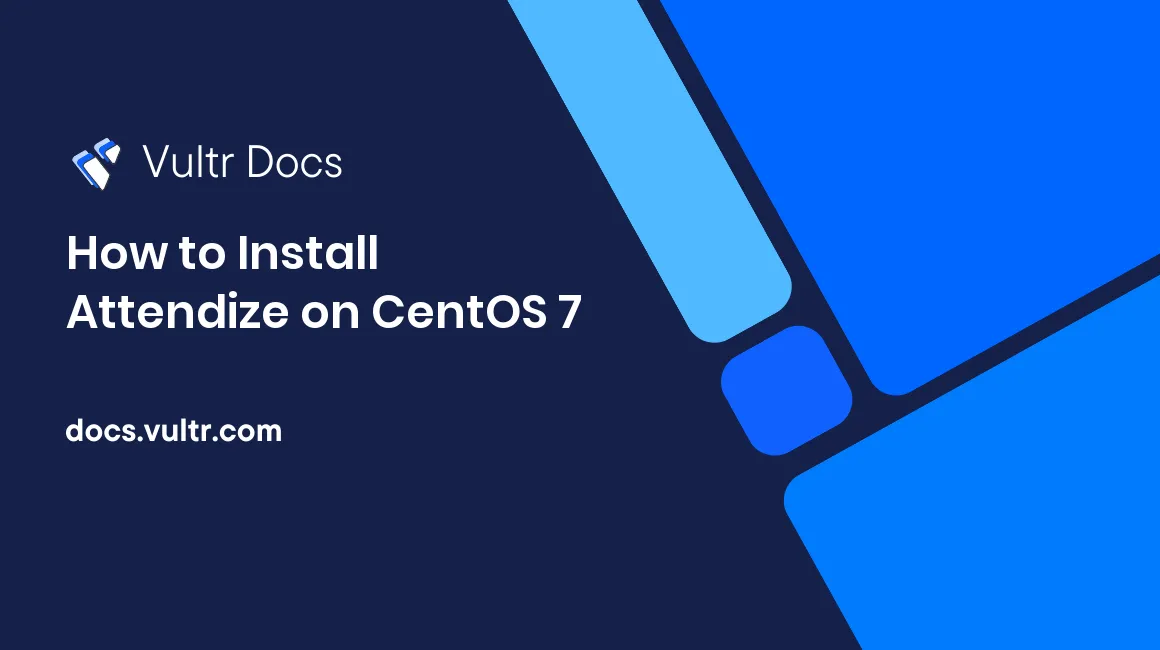
Introduction
Attendize is an open source ticket selling and event management platform based on the Laravel PHP Framework. Attendize source code is publicly hosted on Github. This guide will show you how to install Attendize on a fresh CentOS 7 Vultr instance.
Requirements
- Nginx
- MariaDB
- PHP version 7.1.3 or greater with the following extensions:
- OpenSSL
- PDO
- Mbstring
- Tokenizer
- Fileinfo
- GD
Before you begin
Check the CentOS version.
cat /etc/centos-release
# CentOS Linux release 7.6.1810 (Core)Create a new non-root user account with sudo access and switch to it.
useradd -c "John Doe" johndoe && passwd johndoe
usermod -aG wheel johndoe
su - johndoeNOTE: Replace johndoe with your username.
Set up the timezone.
timedatectl list-timezones
sudo timedatectl set-timezone 'Region/City'Ensure that your system is up to date.
sudo yum update -yInstall needed packages to finish this tutorial.
sudo yum install -y git wget curl vim unzipDisable SELinux and Firewall.
sudo setenforce 0 ; sudo systemctl stop firewalld ; sudo systemctl disable firewalldInstall PHP
Setup the Webtatic YUM repo.
sudo rpm -Uvh https://mirror.webtatic.com/yum/el7/webtatic-release.rpmInstall PHP, as well as the necessary PHP extensions.
sudo yum install -y php72w php72w-cli php72w-fpm php72w-common php72w-mysql php72w-curl php72w-json php72w-zip php72w-gd php72w-xml php72w-mbstring php72w-opcache php72w-pgsqlCheck the version.
php --version
# PHP 7.2.16 (cli) (built: Mar 10 2019 21:22:49) ( NTS )
# Copyright (c) 1997-2018 The PHP Group
# Zend Engine v3.2.0, Copyright (c) 1998-2018 Zend Technologies
# with Zend OPcache v7.2.16, Copyright (c) 1999-2018, by Zend TechnologiesStart and enable PHP-FPM.
sudo systemctl start php-fpm.service
sudo systemctl enable php-fpm.serviceInstall MariaDB and create a database
Install MariaDB.
sudo yum install -y mariadb-serverCheck the version.
mysql --version
# mysql Ver 15.1 Distrib 5.5.60-MariaDB, for Linux (x86_64) using readline 5.1Start and enable MariaDB.
sudo systemctl start mariadb.service
sudo systemctl enable mariadb.serviceRun mysql_secure installation to improve security and set the password for the root user.
sudo mysql_secure_installationLog into MariaDB as the root user.
mysql -u root -p
# Enter passwordCreate a database and user that you will use for your installation of Attendize, and remember the credentials.
CREATE DATABASE dbname;
GRANT ALL ON dbname.* TO 'username' IDENTIFIED BY 'password';
FLUSH PRIVILEGES;
quitInstall and configure Nginx
Install Nginx.
sudo yum install -y nginxCheck the version.
nginx -v
# nginx version: nginx/1.12.2Start and enable Nginx.
sudo systemctl start nginx.service
sudo systemctl enable nginx.serviceRun sudo vim /etc/nginx/conf.d/attendize.conf and populate the file with the following configuration.
server {
listen 80;
listen [::]:80;
server_name example.com; # Check this
root /var/www/attendize/public; # Check this
index index.php;
location / {
try_files $uri $uri/ /index.php?$query_string;
}
location ~ \.php$ {
try_files $uri =404;
fastcgi_pass 127.0.0.1:9000; # Check this
fastcgi_param SCRIPT_FILENAME $document_root$fastcgi_script_name;
include fastcgi_params;
}
}Test the configuration.
sudo nginx -tReload Nginx.
sudo systemctl reload nginx.serviceInstall Composer
Install Composer globally.
php -r "copy('https://getcomposer.org/installer', 'composer-setup.php');"
php -r "if (hash_file('SHA384', 'composer-setup.php') === '48e3236262b34d30969dca3c37281b3b4bbe3221bda826ac6a9a62d6444cdb0dcd0615698a5cbe587c3f0fe57a54d8f5') { echo 'Installer verified'; } else { echo 'Installer corrupt'; unlink('composer-setup.php'); } echo PHP_EOL;"
php composer-setup.php
php -r "unlink('composer-setup.php');"
sudo mv composer.phar /usr/local/bin/composerCheck the version.
composer --version
# Composer version 1.8.5 2019-04-09 17:46:47Install Attendize
Create a document root directory.
sudo mkdir -p /var/www/attendizeChange ownership of the /var/www/attendize directory to johndoe.
sudo chown -R johndoe:johndoe /var/www/attendizeNavigate to the document root directory.
cd /var/www/attendizeDownload the latest release of Attendize and unzip it.
wget https://github.com/Attendize/Attendize/archive/v1.2.0.zip
unzip v1.2.0.zip
rm v1.2.0.zip
mv Attendize-1.2.0/* . && mv Attendize-1.2.0/.* .
rmdir Attendize-1.2.0Make a copy of the environment configuration file.
cp .env.example .envRun composer to install the various libraries.
composer installNOTE: If your system has less than 2GB memory, you may run into errors when running composer install command. To overcome this, configure a larger amount of swap memory.
Generate an application key.
php artisan key:generateChange ownership of the /var/www/attendize directory to nginx.
sudo chown -R nginx:nginx /var/www/attendizeRun sudo vim /etc/php-fpm.d/www.conf and set the user and group to nginx. Initially, they will be set to apache.
sudo vim /etc/php-fpm.d/www.conf
# user = nginx
# group = nginxRestart the PHP-FPM service.
sudo systemctl restart php-fpm.serviceNavigate to http://example.com/install and you will see the installer screen. After following the on-screen instructions, Attendize will be installed.
No comments yet.